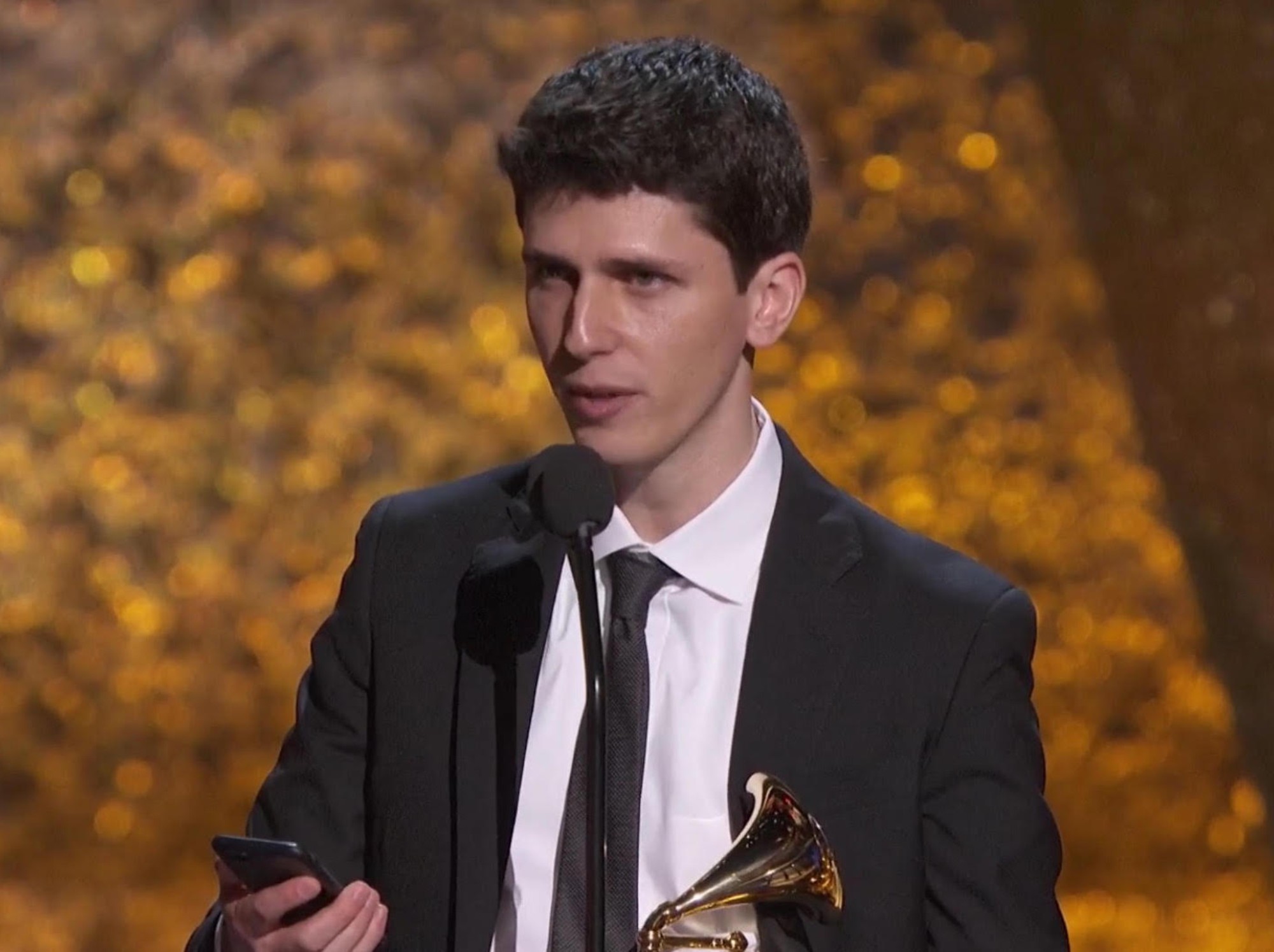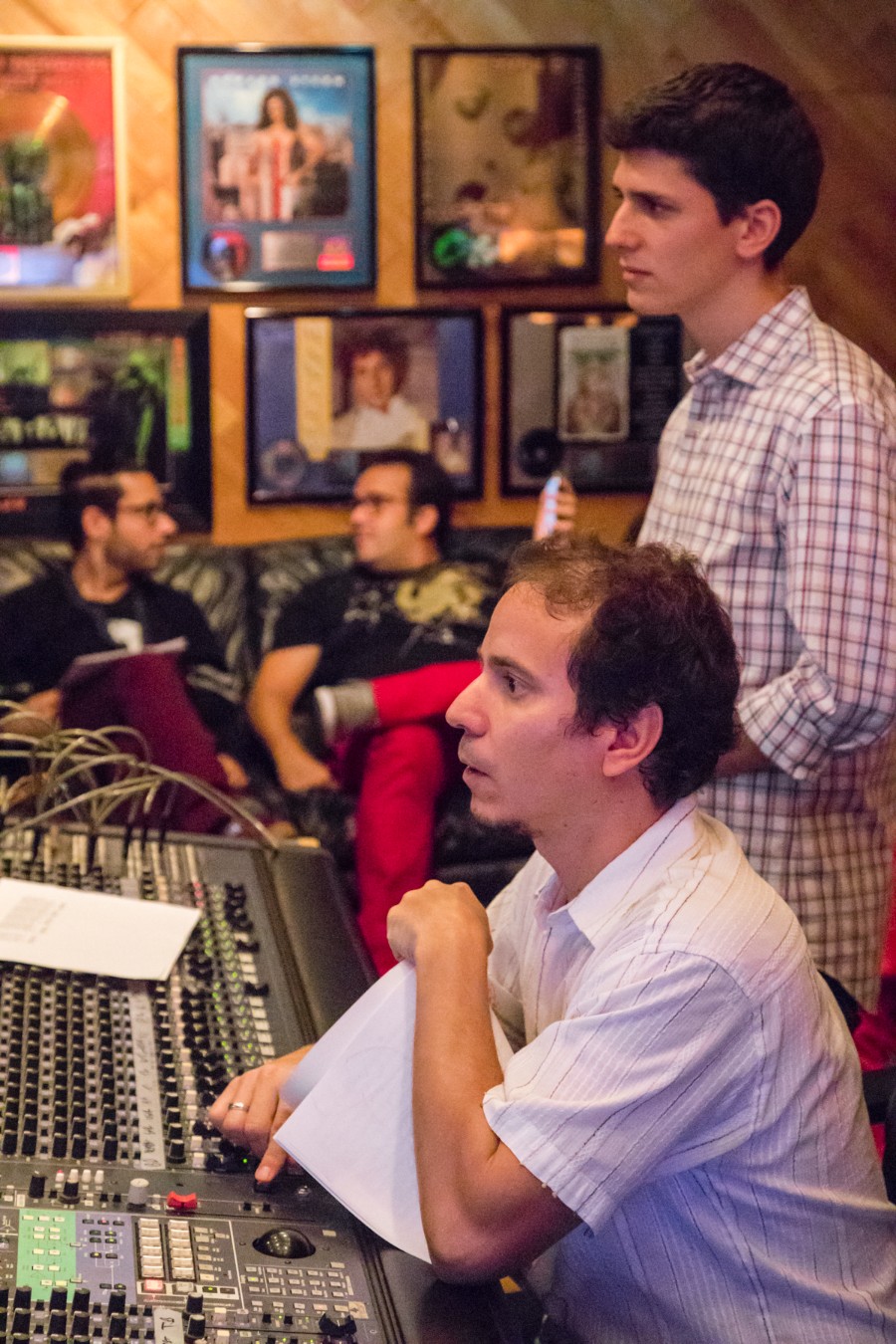Who knew that the Latin music filling the backyard at Grandpa’s house in Queens would act as a seed in the life of TC alum Eric Oberstein (ARAD’09), a seed that would take root as he became involved in music, eventually blossoming into a very impressive career in the arts? That impressive career includes several Grammy and Latin Grammy awards which reflect the deep roots and dedication that have been cultivated over time.

Eric Oberstein accepting the Grammy Award for Best Latin Jazz Album for Back to Sunset, the debut album of Dafnis Prieto Big Band
Although his parents weren’t musicians, the Latin musical roots from his Cuban mom cross-pollinated with the diverse musical roots from his American dad to produce in Eric a love for all music. His love for music was nurtured as he took violin and saxophone lessons, taught himself drums and percussion, and immersed himself in musical life in high school. Eric even recorded his first album with his high school rock band; little did he know that he would soon be professionally producing albums with some of the most well-known and accomplished musicians and composers in NYC and the world.
Eric went off to Duke for undergrad, thinking he was going to study journalism, but the introduction to public policy “weed-out” class effectively weeded him out. However, the seeds of music were still very much alive and growing in him. As Eric was looking for classes for the next semester, he came across a cultural anthropology seminar on Cuba. Thinking it would be a great opportunity to learn more about his family’s history and heritage, Eric took the class and discovered a new love, saying, “Ultimately, I became a cultural anthropology major and wrote my senior distinction thesis on Cuban music. That was a big part of my Duke career, but I was also playing music and performing alongside my studies during undergrad.”
Midway through his Duke career, Eric actually did a semester back in his native New York City through Duke’s Arts and Media Program where students live and study here, take arts and media classes with Duke professors, take electives at NYU, and complete an internship at an arts organization of their choice. During that semester, Eric interned at Jazz at Lincoln Center.
“That was my first time seeing a professional arts organization of that caliber from the inside,” Eric noted. “I never knew what arts management or arts administration was, but I loved music, I loved going to performances, but aside from the leadership roles I held in school and the rock band I had in high school, I hadn’t really thought about how these organizations actually run from the inside.”
“The theme of my life is being intentional, but also open to opportunities. I’ve been fortunate to be able to meet a lot of great people and collaborators by having that orientation. Not taking blind risk but pursuing the things that are meaningful to me in a way that feels right to me, being open to the things the universe throws at me. It’s worked out so far!”
-Eric Oberstein
Getting this inside look was very revealing for Eric. Being a naturally organized person who enjoys managing projects and working in leadership capacities, Eric explains, “I realized there’s this field where you can actually provide structure for artists, present artists in a way that can be strategic and build a foundation for all this work. The lightbulb went off for me that semester in NYC. I went back to Duke thinking, ‘I found it! I found my thing!’” Eric had discovered arts administration.
“I wanted to learn how to run an arts organization from top to bottom. I had these good jobs, great experiences, and leadership roles, but I wanted to learn it in a structured way.” So Eric applied to the Arts Administration program (ARAD) at Teachers College . A kid fresh out of undergrad, Eric credits the Arts and Administration program for giving him the space and structure he needed to deeply reflect on the questions that are relevant and pressing in the field.
As he looks back on his time at TC, Eric warmly comments, “I’m grateful for the time I had in the program because it helped me think in a very structured way how you build realities for work in the arts. I loved classes at TC and how the professors invited our ideas and encouraged curiosity, also constantly tying it back to real life, combining both theory and practice.”
During his time at TC, one can clearly see how Eric lives out the self-proclaimed theme of his life. “The theme of my life is being intentional, but also open to opportunities. I’ve been fortunate to be able to meet a lot of great people and collaborators by having that orientation. Not taking blind risk but pursuing the things that are meaningful to me in a way that feels right to me, being open to the things the universe throws at me. It’s worked out so far!” One example of this is how Eric began working with Arturo O’Farrill, the band leader and artistic director of the Afro Latin Jazz Orchestra as well as the founder of an educational and performance nonprofit. After writing a note to Arturo on the back of a survey inserted in a concert program, Eric received a message from Arturo and his wife, asking if he was still interested in working with the nonprofit and if he was up for chatting about it. Eric was thrilled. “It’s the music that I love - Latin jazz. It’s part of my heritage, something that I studied and now to have the opportunity to work with Arturo and an orchestra of that caliber, that’s very exciting.”
That chat blossomed into Eric becoming assistant director, working closely with Arturo and their board that year. “It was an incredible experience. Ultimately, I had decided that I wanted to do one more year of school after finishing at TC, so I went up to Harvard Graduate School of Education to study Arts in Education because I knew that I wanted to be leading or working with arts organizations that had a strong educational focus, whether that be in a higher education setting or community arts engagement.” While at Harvard, While at Harvard, Eric wrote Arturo again, saying that the organization really needed a full time staff member, and he would love to be that person. Arturo recognized Eric’s hard work over the past year and found a way to cobble together a starting salary for Eric, who was named Executive Director of the Afro Latin Jazz Alliance.
Working with Arturo’s nonprofit was the perfect scene for Eric to put all that he was learning at TC into practice, while also learning additional invaluable skills. Eric had no idea what it meant to be a producer before Arturo invited him into the studio to essentially be an assistant producer. Arturo gave Eric an opportunity that fertilized a new skill that would later win him several Grammys: he asked Eric to sit with the engineer, learn what he did, take notes, listen, and give feedback throughout the process. “That was essentially the beginning of me learning what a producer does. For me, as a producer, I am with the artist from start to finish on that album. From the initial seed of an idea or conversation about music and repertoire to answering all sorts of questions. What is the narrative around the story? What is the arc to the project? How are we going to raise the money to do it? Who are the musicians we’re gonna hire and where will we record? The list of questions goes on and on. I do all the legwork and oversee the rehearsal process. Ultimately, I’m there running the recording sessions, and keeping us on budget and on schedule, hopefully being a calm presence in what can be a very high stress situation.”
As Eric started working more with Arturo, he was invited to produce more of Arturo’s projects with the Afro Latin Jazz Orchestra. “What has been phenomenal is that I’ve gotten to work with some of the best world-class Jazz and Latin jazz musicians in New York. We had tremendous success, receiving nominations and several of our projects have won Grammys over the past several years.”
A few years ago, Eric’s mentor from his time at Duke called him up, asking if he would consider coming back to work at Duke Performances. “Given my love for Duke, but also my interest in the growth of the arts at Duke, interest in Duke performances, and interest in Durham as a mid-sized city going through its own sort of cultural renaissance, my mentor thought that might be attractive to me. And when your mentor comes calling, it’s hard to say no.” In the end, Eric took that opportunity and is now going on 7 years back in Durham at Duke Performances, but he also didn’t want to lose touch with Arturo. “I wanted to keep my relationship with Arturo and kept producing projects from afar, using Skype and phone calls, flying in when necessary for rehearsals and recording sessions and meetings.”

Eric Oberstein in the studio with Dafnis Prieto
A few years ago, Eric again displayed his commitment to the theme of his life, stepping out to be intentionally bold in the direction he hoped to go. In 2016, he reached out to Dafnis Prieto, a Cuban drummer, composer, and educator. Eric had always thought Dafnis needed his own big band, so he asked if Dafnis would be interested in collaborating on something. “To his credit, he said, ‘Yeah, let’s talk,’ so I asked him what his dream project was. He said, ‘Big band.’” So they gave themselves some time and worked on Back to Sunset for the last 3 years, releasing it in April of 2018. While grateful for being recognized with the Grammy, Eric shares, “Winning a Grammy isn’t why we do the work, but it’s encouragement to keep doing it. Because we self-released this project, it holds a lot of importance for me. It was really accomplished through the skills that I learned through the Arts Administration program at TC: how you build a reality for the work you want to do, and how you build the structure for the work you want to do. I think about that daily at Duke Performances as well. I find myself thinking everyday about the things I learned in the Arts Administration program, like how you run an organization responsibly and grow it.”
His experience with the arts in high school, as well as his time at TC and beyond, have been the fertilizer that has nourished the seed of the arts planted in his childhood, providing the trellis of structure that has helped him and those he collaborates with climb upward, bringing GOOD music and arts to all. As he continues to grow in his career, curiosity is what drives him, the hope of exploring the relevant questions in the field and experimenting in pursuit of growth and knowledge that will benefit all.